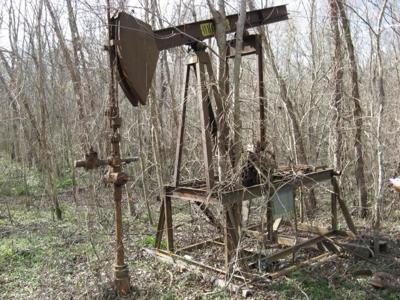Reducing methane emissions from oil and gas operations in Louisiana is the target of a $15.7 million grant given to the state on Friday by the Environmental Protection Agency and Department of Energy.
The state Department of Natural Resources hopes to use the money to convince owners to plug wells that are producing only small amounts of oil or natural gas, but that are leaking methane into the atmosphere. Methane, the main ingredient of natural gas, is a potent greenhouse gas linked to global warming.
The money may also fund other industry efforts to monitor and reduce methane emissions from their operations.
Details of the state's plans for the money must still be approved by the two federal agencies, which will likely happen in January, said DNR spokesperson Patrick Courreges.
In October, Louisiana increased its fines for inactive oil and gas wells, another effort to reduce the number of leaking and often dangerous wells that are abandoned and become the financial responsibility of the state.
Louisiana has already received more than $100 million from other federal programs to plug abandoned wells. The state plugged about 600 of its more than 4,000 abandoned wells this year.
In the U.S., 30% of methane emissions come from the oil and gas sector. The gas is many times more potent than carbon dioxide, the more commonly known greenhouse gas, and is responsible for about a third of the warming from greenhouse gases occurring today, according to the EPA.
Scientists believe that rapid and sharp cuts in methane can slow the rate of warming of the earth's atmosphere.
In Louisiana, that warming is linked to rising sea levels that are causing increases in routine high tide flooding and the height of hurricane storm surges. It's also been linked to more intense rainfall, increased chances of drought and reductions in the flow of the Mississippi River that are in part responsible for saltwater intrusion.
The new EPA funds come from the Inflation Reduction Act's greenhouse gas emission program. On Dec. 2, EPA announced that it had finalized new regulations requiring oil and gas companies to phase out routine flaring of natural gas at wellheads and elsewhere.
“Investing in projects and programs that significantly reduce methane emissions is an important priority to slow the harmful effects of climate change,” said Ryan Peay, Deputy Assistant Secretary for the Office of Resource Sustainability in DOE's Office of Fossil Energy and Carbon Management, in the news release announcing the grants. “The grants awarded today facilitate critical partnerships between states and the oil and gas sector, addressing a key source of these emissions while generating substantial climate, health, and economic benefits for local communities nationwide.”


